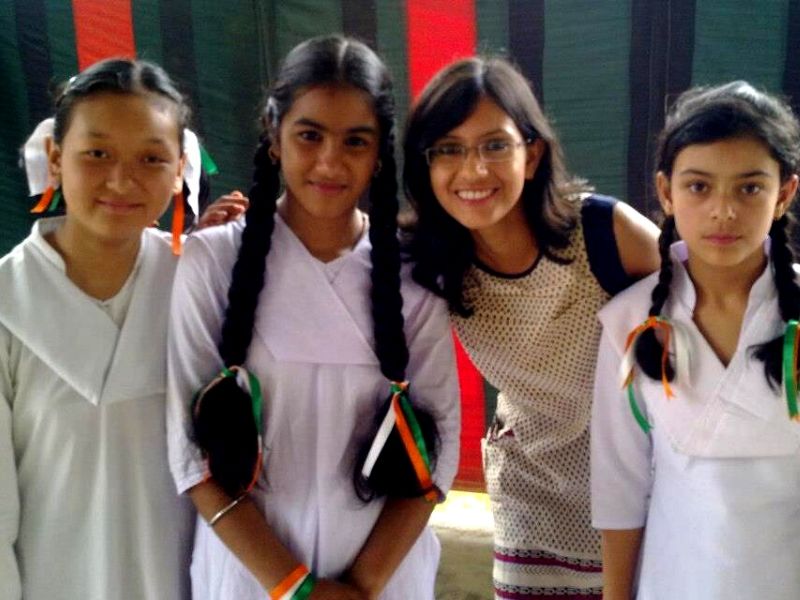Driven by her passion to spread the light of gender education, Shivangi Singh — through her social initiative ‘Drishtikona – Changing Perspectives‘ — has been striving to create an inclusive society. Launched in August 2018, ‘Drishtikona’ has since conducted 50 workshops with 23 schools, as well as government and corporate offices and impacted over 5000 lives across 20 districts and 5 states in India.
 On the occasion of National Girl Child Day, Singh speaks to EducationWorld about her thoughts on feminism and empowering girls.
On the occasion of National Girl Child Day, Singh speaks to EducationWorld about her thoughts on feminism and empowering girls.
Well aware of the verses of patriarchy herself, Singh too, faced challenges while growing up. She tells us, “As a child, I was not allowed to go on school trips. I had to drop out of the national-level debate competition. The number of career opportunities I had to let go of because I was simply not allowed to do so is unbelievable. My decision to go for engineering was scorned upon because my family didn’t consider it an ideal career path for women. I was never allowed to opt for a corporate job. Along with my career, this also affected my mental health severely.”
“It is strange that even as adults our lives are heavily controlled by families and at large, by the patriarchal society. If we need things to change then we need to give the same freedom to our girls that we reserve for the boys. Protectionism is the garb our society uses to cover its sickeningly discriminatory mindset,” says Singh.
Excerpts from the interview:
India slipped to 112th place on the gender gap report this year from 108th, according to the World Economic Forum. Despite several Indian women becoming CEOs (Arundhati Bhattacharya, Kalpana Morparia) and making it to the Forbes list of most powerful women, there’s a huge section of women lagging behind when it comes to gender parity. How do you think the situation can be changed?
Patriarchy is the real culprit here. Across India, rural as well as urban, the mindset is to control women and curb their rights to lead an autonomous life. As long as men will continue telling women what to do or rather what they are or aren’t ‘allowed’ to do, we won’t progress in closing the gender gap.
There is a misconception that women from financially privileged backgrounds don’t face the challenges of patriarchy. While it is true that the challenges for women from marginalised backdrops are enormous, I know several women from higher-income families, who weren’t allowed to take up jobs or colleges or courses of their choice. How can we imagine women to be truly empowered when at every step the world is constantly looking for opportunities to clip their wings while men are allowed to get away with anything under the sun?
Despite government projects to empower women and girl child such as ‘Beti Bachao, Beti Padhao’, ‘National Scheme of Incentives to Girls for Secondary Education’, there’s not been much success on this front. What do you think society can do to educate not only women but men as well about the gender gap?
At present, our government and society act from a protectionist viewpoint, treating women as lesser beings or entities in need of urgent care to be looked after by men. Affirmative action and policies are good but if our policy-makers aren’t the right people then how can their implementation be guaranteed?
People often believe that there is a certain way in which women should be empowered. I have often heard my elders say, “Women should be educated enough to teach their children but not so they will scare away their husbands and in-laws.” Basically, the society aims at empowering women in such a way that “they never forget their place” which for them means leading a life of servitude.
As long as a society will continue treating women’s basic rights as favours given to them by men, no amount of policies would change reality. For reality to change, we need a shift in perspectives and mindsets. How can you dream of educating all women with ‘Beti Bachao, Beti Padhao’ when parents don’t give basic rights to their girls. Don’t expect the government to intervene here as they could care less. After all, our elected representatives are a function of grotesque patriarchy.
“There is a widespread chronic lack of awareness, gender education and sensitisation amongst the masses.”
For mindsets to change, gender education must be mandatory for people of all age groups and implemented as part of the core education curriculum in schools and colleges. Care must be taken that it does not suffer the same fate as MC Mehta’s Environmental Education did where it was reduced to a mere formality in the coursework.

Shivangi Singh while teaching girls.
Tell us about your social initiative – Drishtikona – Changing Perspectives including what happens in a workshop and how your non-profit venture is helping in making a difference to the society and women in particular.
At Drishtikona, we work towards eradicating patriarchy, challenging heteronormativity and achieving gender equality through gender education. To achieve this goal, I have developed gender education and sensitivity modules which are disseminated in a 10-day workshop format.
The subject matter of the workshop deals with a different issue each day. It was designed based on my discussions with my professors at YIF, Urvashi Butalia, and Geetanjali Chanda.
The workshops begin with how gender roles are presented to us since our childhood, the need and importance of gender equality – how patriarchy and toxic masculinity are harmful to everyone and why feminism is no longer a choice but the need of the hour.
We share gender-based crime statistics and talk about homosexuality, sexual choice of women and gender fluidity. We also discuss the various taboos surrounding women’s bodies such as menstruation and why it is only women’s bodies that are highly politicised and also talk about everyday sexism at homes, workplaces, and streets.
Participants and I openly share our encounters with sexism, gender-based crimes, sexual violence or discrimination. If I feel the participant feels the need for additional support, then I offer my services as a Counseling Psychologist and offer one to one counseling sessions.
You are also trying to create ‘mental health awareness and menstrual hygiene management’ through your social enterprise. Tell us more about it.
Apart from our staple workshops on Gender Education and Sensitisation, we run a couple of other programmes focusing on mental health and MHM.
Through our workshop ‘Boond’ we aim to make pre-teen and teenage girls comfortable with their bodies and menstrual cycles. We aim to educate them about safe menstrual practices, alternatives available to them such as menstrual cups and pads made of sustainable materials. We aim to bust the myths and superstitions around menstruation and make them accept it as a natural and healthy part of their lives.
Through our workshop ‘Dhairya’, we aim to build resilience in the students. It provides individuals with a psychological toolkit and mental framework to successfully maneuver distress and potentially severe depression and anxiety causing situations in life. The workshop is primarily activity-based and there is little in terms of lecturing or teaching involved.
‘Laqshya’ is a 5-day workshop for girls in the age group of 10 to 18 to help them set achievable goals in life and provide a well-researched psychological toolkit on how to go about achieving those. This workshop is based on the principle of Ikigai and utilizes the works of David Goleman, Dale Carnegie, Stephen R Covey, Norman Vincent Peale, Rhonda Byrne, Robin Sharma, Paulo Coelho and Deepak Chopra.
Through ‘Swayam’, we provide training modules for girls in the age group of 11 to 19 to equip them with skills needed to develop a healthy self-concept. This psychological tool kit is developed on the works of humanistic psychologist Carl Rogers and is based on the principles of Neuro-Linguistic Programming and Cognitive Behavioral Therapy.
‘Pehchaan’ is a 7-day workshop and training program countering racism and homophobia in India for all age groups.
Recommended: Girl children champion
On this National Girl Child Day (January 24), what would be your message to young girls who might become leaders of tomorrow?
My message to young girls would be: Persevere, for the world, will try to take away what’s rightfully yours owing to patriarchy. We, as adults and your elder sisters, are trying our best to bring about gender equality. In the meantime, we want you to never give up on your dreams and never give in to patriarchy. Fight for your rights and fight hard.
Never be afraid of standing up for your beliefs. Never let society or anyone make you feel less than. Know that you are right and go for victory with that gut feeling. It is okay to be emotional, it is okay to cry. Don’t let society teach you that being sensitive or in touch with your emotions makes you less strong. If anything, it makes you stronger.
Also read: 1 in 3 adolescent girls from poor households never been to school: UNICEF
Sukanya Nandy
Posted in National, News


























